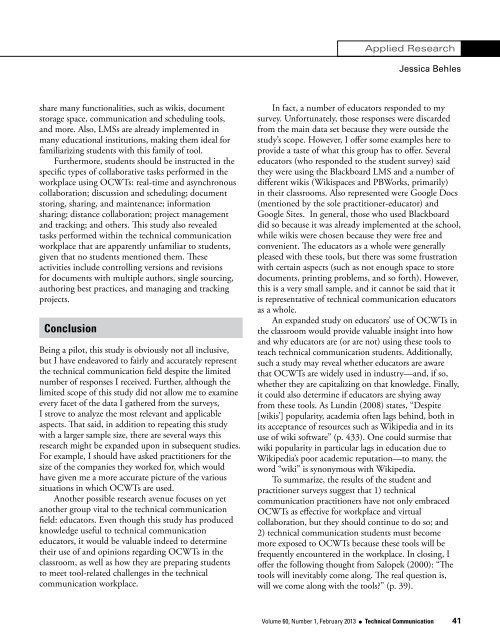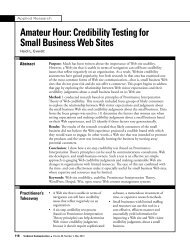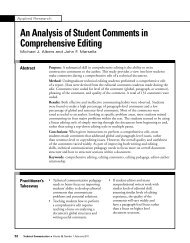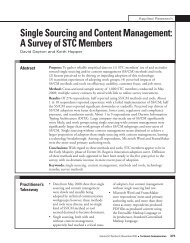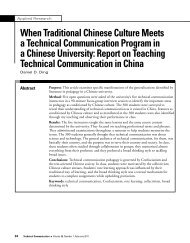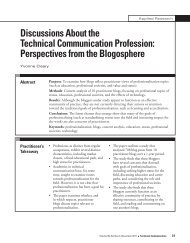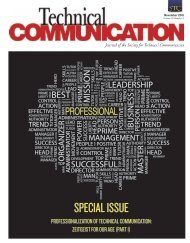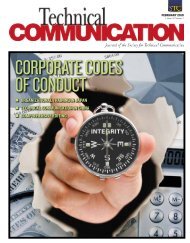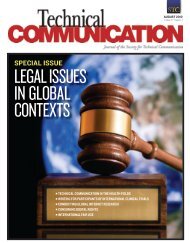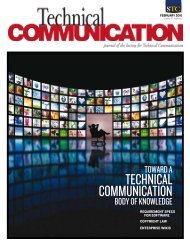The Use of Online Collaborative Writing Tools by Technical ...
The Use of Online Collaborative Writing Tools by Technical ...
The Use of Online Collaborative Writing Tools by Technical ...
Create successful ePaper yourself
Turn your PDF publications into a flip-book with our unique Google optimized e-Paper software.
Applied ResearchJessica Behlesshare many functionalities, such as wikis, documentstorage space, communication and scheduling tools,and more. Also, LMSs are already implemented inmany educational institutions, making them ideal forfamiliarizing students with this family <strong>of</strong> tool.Furthermore, students should be instructed in thespecific types <strong>of</strong> collaborative tasks performed in theworkplace using OCWTs: real-time and asynchronouscollaboration; discussion and scheduling; documentstoring, sharing, and maintenance; informationsharing; distance collaboration; project managementand tracking; and others. This study also revealedtasks performed within the technical communicationworkplace that are apparently unfamiliar to students,given that no students mentioned them. <strong>The</strong>seactivities include controlling versions and revisionsfor documents with multiple authors, single sourcing,authoring best practices, and managing and trackingprojects.ConclusionBeing a pilot, this study is obviously not all inclusive,but I have endeavored to fairly and accurately representthe technical communication field despite the limitednumber <strong>of</strong> responses I received. Further, although thelimited scope <strong>of</strong> this study did not allow me to examineevery facet <strong>of</strong> the data I gathered from the surveys,I strove to analyze the most relevant and applicableaspects. That said, in addition to repeating this studywith a larger sample size, there are several ways thisresearch might be expanded upon in subsequent studies.For example, I should have asked practitioners for thesize <strong>of</strong> the companies they worked for, which wouldhave given me a more accurate picture <strong>of</strong> the varioussituations in which OCWTs are used.Another possible research avenue focuses on yetanother group vital to the technical communicationfield: educators. Even though this study has producedknowledge useful to technical communicationeducators, it would be valuable indeed to determinetheir use <strong>of</strong> and opinions regarding OCWTs in theclassroom, as well as how they are preparing studentsto meet tool-related challenges in the technicalcommunication workplace.In fact, a number <strong>of</strong> educators responded to mysurvey. Unfortunately, those responses were discardedfrom the main data set because they were outside thestudy’s scope. However, I <strong>of</strong>fer some examples here toprovide a taste <strong>of</strong> what this group has to <strong>of</strong>fer. Severaleducators (who responded to the student survey) saidthey were using the Blackboard LMS and a number <strong>of</strong>different wikis (Wikispaces and PBWorks, primarily)in their classrooms. Also represented were Google Docs(mentioned <strong>by</strong> the sole practitioner-educator) andGoogle Sites. In general, those who used Blackboarddid so because it was already implemented at the school,while wikis were chosen because they were free andconvenient. <strong>The</strong> educators as a whole were generallypleased with these tools, but there was some frustrationwith certain aspects (such as not enough space to storedocuments, printing problems, and so forth). However,this is a very small sample, and it cannot be said that itis representative <strong>of</strong> technical communication educatorsas a whole.An expanded study on educators’ use <strong>of</strong> OCWTs inthe classroom would provide valuable insight into howand why educators are (or are not) using these tools toteach technical communication students. Additionally,such a study may reveal whether educators are awarethat OCWTs are widely used in industry—and, if so,whether they are capitalizing on that knowledge. Finally,it could also determine if educators are shying awayfrom these tools. As Lundin (2008) states, “Despite[wikis’] popularity, academia <strong>of</strong>ten lags behind, both inits acceptance <strong>of</strong> resources such as Wikipedia and in itsuse <strong>of</strong> wiki s<strong>of</strong>tware” (p. 433). One could surmise thatwiki popularity in particular lags in education due toWikipedia’s poor academic reputation—to many, theword “wiki” is synonymous with Wikipedia.To summarize, the results <strong>of</strong> the student andpractitioner surveys suggest that 1) technicalcommunication practitioners have not only embracedOCWTs as effective for workplace and virtualcollaboration, but they should continue to do so; and2) technical communication students must becomemore exposed to OCWTs because these tools will befrequently encountered in the workplace. In closing, I<strong>of</strong>fer the following thought from Salopek (2000): “<strong>The</strong>tools will inevitably come along. <strong>The</strong> real question is,will we come along with the tools?” (p. 39).Volume 60, Number 1, February 2013 l <strong>Technical</strong> Communication 41


